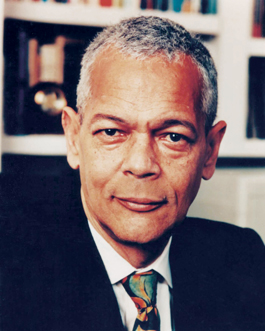home | metro santa cruz index | news | santa cruz | news article

The Rights Stuff: Civil rights veteran Julian Bond speaks on 'Civil Rights: Then and Now' on Jan. 30 at the Civic.
Bond's Issues
NAACP Chairman Julian Bond heads to Santa Cruz for a Jan. 30th engagement.
By Steve Hahn
Julian Bond has a unique perspective on the upcoming presidential elections. As a man who has been on the front lines of the civil rights movement since the 1960s and heavily involved in national politics since he took the helm of the National Association for the Advancement of Colored People (NAACP) in 1998CK, Bond has lived through the peaks and troughs of civil rights in this country, and that experience shapes his view.
While he doesn't endorse a specific candidate (his leadership position within the NAACP forbids it), Bond, who speaks at the Civic Auditorium next Wednesday as part of UCSC's Martin Luther King Jr. Convocation, does maintain hope that the next administration will do a better job of enforcing the anti-discrimination laws that he and his colleagues fought so hard for.
"[In the next administration we need] a commitment to enforcing the civil rights laws that are on the books now, which the current administration has failed to do," says Bond. "In fact, they have subverted those laws and weakened the enforcement mechanism."
If anyone can speak to the intentions of civil rights legislation, it is Bond. He was nothing less than foundational to the civil rights movement. He was one of the original members of the Student Nonviolent Coordinating Committee, the civil rights organization that included young white college kids and which ultimately gave birth to the antiwar movement. Bond also helped to set up and run the Southern Poverty Law Center, an organization providing discounted legal help to and advocating for low-income African Americans, from 1971 to 1979.
Furthermore, as an elected official in the mid-'60s, Bond faced the fury of Southern racism. He attempted to take his seat in Georgia's House of Representatives no fewer than three times in 1965 before the U.S. Supreme Court finally forced the House to let him in. He took office in 1966, a full year after he had been elected.
This is only the tip of the iceberg when it comes to Bond's history in organizing for the rights of African Americans. Today, Bond continues his work in pushing for equal treatment for minorities and the poor as leader of the NAACP. He has noticed a shift to a more tolerant society in general terms, but is dismayed at the persistent racism that he still sees in some quarters.
"It's hard to give a strict accounting of what the decrease in racist activity has been," says Bond. "But you have to say that [the decrease] has occurred and that's all to the good. At the same time, we've just seen a TV commentator say that Tiger Woods ought to be lynched. Just when you think everything is fine, you get reminded that it's not."
Bond believes that the next administration will have a valuable chance to rebuild the bond of trust between the government and African Americans that was ravaged by the lackluster federal response to Hurricane Katrina.
"We need to have someone in FEMA [Federal Emergency Management Agency] who actually believes in disaster assistance," says Bond, giving a hint of his penchant for controversial statements. "Clearly the people who are there now have not believed in that. If this had been an overwhelmingly white city, you can't believe that the response would have been as awful as it was."
In Washington, Bond sees a lot of work to be done if the United States hopes to regain its status as an international leader in civil and human rights. Bond perceives a need to reorganize not just FEMA, but all three branches of government."[We need changes ranging] from the judicial appointees, who as a general proposition are hostile to civil rights, to the administration appointees in the Department of Justice, who similarly are hostile to civil rights enforcement, and to the now-minority in the Congress, which is also generally opposed to civil rights enforcement," argues Bond. "A change in all three of those would be very much welcome."
While Bond has been known for delving into pure political rhetoric—such as an attack on President Bush's cabinet selections in 2001 that characterized the new government as "the Taliban wing of American politics ... whose devotion to the Confederacy is nearly canine in its uncritical affection"—this time he has plenty of objective fact to back up his statements. The Citizen's Commission of Civil Rights found that the Civil Rights Division of the Justice Department has been severely gutted since Bush took office—with 19 out of 35 attorneys in the voting rights section transferred or removed from their posts since 2005, 21 out of 32 attorneys in the equal employment section transferred or removed, and six out of 12 attorneys in the appellate section transferred or removed. In other words, there are 52 fewer federal lawyers available to fight discrimination since Bush took office.
Bond hopes the next administration will get its act together and change course. If it doesn't, it can be assured the NAACP will be on its case from the start.
Of the NAACP, Bond says, "We hope to get bigger, badder, bolder and richer."
JULIAN BOND, chairman of the NAACP, will speak at UCSC's 24th annual Martin Luther King Jr. Convocation on Wednesday, Jan. 30, at 7pm at Civic Auditorium, 307 Church St., Santa Cruz; free; 831.420.5240.
Send a letter to the editor about this story.
|
|
|
|
|
|